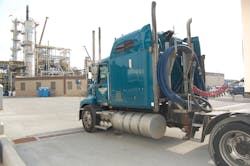Safety-Kleen projects growth for re-refined engine oil products
The market for re-refined motor oils for both gasoline and diesel engines is expected to grow both near- and long-term as the price of oil escalates and fleet operations continue to feel pressure to engage in a variety of “sustainability” efforts designed to reduce their carbon footprint.
That’s the view oil recycling firm and lubricant maker Safety-Kleen presented during a media tour of its East Chicago re-refinery operation this week – a facility that just opened an onsite lubricant blending plant back in July to produce a variety of re-refined hydraulic and motor oils, including its EcoPower product for diesel engines.
[For a more in-depth understanding of how re-refined motor oils are made, you can watch a video of the process Safety-Kleen uses by clicking here.]
“The customers of fleets and other logistics operators want to protect the environment more and want their transportation providers to be more sustainable,” said Barry McCabe, Safety-Kleen’s director of marketing for EcoPower, at the event.
“Look at UPS and FedEx: they fight all day about which of them is greener,” he explained. “But even a guy with one truck that has customers who potentially care more about doing business with someone who is a little more green than the next guy can gain an advantage from using re-refined motor oil.”
The critical point, stressed McCabe, is that re-refined motor oils now cost roughly the same – or even a little less – compared to motor oils made from crude oil. “But if a fleet uses a million gallons of EcoPower per year, they can cut carbon emissions by 7,500 metric tons per year – and it doesn’t cost them anything, compared to other methods for reducing carbon dioxide (CO2) from trucks.”
Mike Ebert, Safety-Kleen’s VP of oil engineering and business development, told Fleet Owner than another big factor that will keep driving the re-refined motor oil market is that the development of such “re-refined” products has turned what was once considered shop waste into a valuable commodity.
“Years ago, when Safety-Kleen started hauling away waste oil, customers paid us for that service,” he told Fleet Owner. “Today, we’re paying them for that used oil. There’s no national index yet for used oil – it’s still very much sold on a regional basis – but what we’d call ‘good’ used oil without any major contaminants like PCBs [polychlorinated biphenyls] can bring a fleet 20 cents to $1.50 per gallon.”
McCabe noted that as more re-refined motor oils demonstrate that they can match the engine protection provided by “virgin” products made from crude oil – citing not only Safety-Kleen’s EcoPower engine oil but Valvoline’s NextGen motor oil as well, of which is 50% re-refined product – he expects more fleets to consider making the switch.
And Ebert stressed that there’s plenty of what he called “raw material” available to increase production of re-refined engine oils, too.
“We estimate there’s about 900 million gallons of used oil produced annually in the U.S., of which only about 220 million gallons is captured and re-refined,” he said. “The rest is still mostly thrown away or burned in waste oil heaters. That’s why we think there’s still a lot of room to grow the re-refined motor oil market; there’s still plenty of ‘feedstock’ available.”
About the Author
Sean Kilcarr
Editor in Chief
Sean Kilcarr is a former longtime FleetOwner senior editor who wrote for the publication from 2000 to 2018. He served as editor-in-chief from 2017 to 2018.
